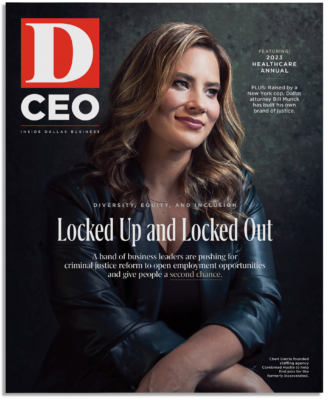Performance. Dependability. Loyalty. Business owners dream of employees with these traits, and when they find them, they do everything they can to hang on to them. In a tight labor market, organizations are looking for employees to fill what the Bureau of Labor Statistics says are 9.6 million job openings in the U.S. At the same time, tens of millions of Americans who have a chance to offer these qualities are overlooked because of roadblocks, bias, and tradition.
Research shows that 70 to 100 million Americans have a criminal record, around one in three working-age adults. Sixty percent of them are unemployed a year after leaving prison. This group is underutilized and bypassed for the millions of jobs that remain open across all industries, but the winds are shifting.
Justice-impacted individuals face several challenges to reentering the workforce and staying out of trouble. These barriers, imposed by legislation, law enforcement, employers, and society, make it more likely that they’ll run afoul of the law again. But several businesses are taking the bold step to be the leading edge of the movement to put this group of people to work.
“The bottom line is this: it is cheaper to train these people and provide them access to use these services than it is to incarcerate them for a period of time.”
Kenitra Brown, SMU
The Responsible Business Initiative for Justice compiled data to show that justice-impacted individuals compare well to the average employee. A survey of human resource professionals and managers found that 83 percent rated the job performance of justice-impacted individuals to be as good or better than the average worker, and about three-fourths found that justice-impacted workers are as or more dependable than the average employee. Seventy percent said job retention was also better for justice-impacted individuals.
“You are going to find some of the most loyal and dedicated and engaged employees because you gave them this opportunity and this chance to acclimate into the work world that they haven’t had in the past,” says Gabe Madison, president Bonton Farms, a nonprofit that has become a force for social change in southern Dallas.
This potential labor force faces many barriers, experts say. First, employers must be willing to take a chance on justice-impacted applicants. Second, those individuals need access to various services to help them get up to speed and become stable and ready to enter the workforce. And lastly, policies need to be updated to help people transition. Success will require progress in all three areas.

Breaking Barriers
Formerly incarcerated individuals face countless challenges when it comes to reentering society and finding a job where they can make enough to keep them away from whatever got them in trouble in the first place. Although our system says these individuals have paid their debt to society, they face substantial hurdles to achieving a stable and prosperous existence.
Depending on how long they have been away from the workforce, they may not be up to speed on the technology they need or how to access job applications. Even if they know how to navigate the world with a smartphone, they haven’t had access to one while incarcerated, meaning they must reestablish email addresses and the other platforms the rest of us take for granted. There are often unaddressed mental health needs and food security issues for those who leave the justice system, meaning they may need to connect with organizations that can help keep them mentally and physically healthy.
The realities of being in the system also make getting and holding a job more difficult. If someone is on probation or under any sort of criminal justice supervision, they may be limited to the hours they can work or where they can work to meet the requirements of their release. Reliable and efficient transportation to work and requisite appointments are other hurdles.
Even when prisoners attempt to rehabilitate while in the system and gain certifications or training that can help them get a job later, many licensing organizations won’t allow anyone with a felony to be certified, even if the crime is completely disconnected from what they will be doing. Those with applicable skills also face difficulty by noting they have a record on job applications and housing (though many companies have “banned the box” and no longer ask applicants if they have committed a felony or have a criminal record).
Here are some tips for developing second-chance hiring programs.
Pathways
Review and update hiring procedures to ensure they aren’t unnecessarily eliminating justice-impacted candidates, build a candidate pipeline with organizations in the space, and communicate internally to create a common culture of compassion.
Flexibility
Justice-impacted individuals will likely have to meet with parole or probation officers, make mental health appointments, or arrange housing, especially when they first reenter society. Being flexible with schedules will give workers confidence and increase loyalty.
Resources
Businesses can offer resources to help pay old fines, provide transportation, offer financial literacy training, or connect an employee with housing or healthcare. Initiating the conversation and asking what the worker needs to be successful can go a long way.
Finally, anyone who is involved with the criminal justice system has been hit with fines and fees for crimes, misdemeanors, or other infractions throughout the process that can add up to thousands of dollars. Individuals and families already on the edge of poverty may forego necessities, use payday loans, or turn to crime to pay the fees. They can even be jailed for their inability to pay a court debt.
Kenitra Brown is a staff attorney at the Deason Criminal Justice Reform Center and adjunct professor at the SMU Dedman School of Law whose father spent time in prison. Given the barriers faced by this population, she asks the next logical question for employers and individuals. “For a community that is genuinely concerned with what’s happening across populations in Dallas County, what can we do to make sure that we’re helping to remove these barriers or educating folks about the barriers that people are facing for justice-involved?”

The Power of Policy
As with any political topic, companies must proceed with caution when entering the fray. But when an issue is endorsed by both the left and the right, supported by some of the largest corporations in the nation, and positively impacts the bottom line, it becomes easier for businesses to figure out their place in changing how justice-involved individuals are treated.
Advocacy can take many forms for corporations. On one end are organizations like JPMorgan Chase & Co., whose chairman and CEO Jamie Dimon penned an op-ed in The New York Times about second-chance hiring. The financial services giant has been a leader in the space, advocating in Texas for clean slate legislation that would automatically seal criminal records where individuals had met time and good behavior requirements, so people don’t have to hire a lawyer to get it done.
“These are things that resonate with both sides of the aisle, and I think it’s the right thing to do.”
Dave Emerick, JPMorgan Chase & Co.
Around 6.5 percent of people eligible to have their record sealed or expunged have done so, partly because it is costly and confusing. In Texas’ 2023 legislative session, advocates from JPMorgan, among others, helped get unanimous approval in the State House of Representatives for a clean slate bill that would automate this process. Despite passing in the house, it didn’t have momentum to get through the Senate. There are 12 states that have passed clean slate laws, with campaigns in seven other states, including Texas. The advocacy work has provided a path for 14 million people to have their records sealed, but sealing a record for a federal crime is a different process. The federal Clean Slate Act would help individuals looking to clear low-level convictions streamline the processs for sealing drug records for those who have completed their sentence and remain crime-free for a period of time. The Fresh Start Act would provide federal money to states who have passed clean slate laws to implement the laws, allowing individuals to access housing, employment, and education. Both bills were introduced to Congress in April and have bipartisan sponsors.
Potential partners
Organizations and nonprofits can help employers get educated, become advocates, and connect to potential workers.
- One CommunityUSA
- South Dallas Employment Project
- Second Chance Business Coalition
- Responsible Business Initiative for Justice
Founded and run by philanthropist Toni Brinker, One CommunityUSA is a nonprofit focused on positive change in underserved communities through reentry, restorative justice, career training, and outreach.
The South Dallas Employment Project is a collective of more than 150 nonprofits and companies that provide training, life skills, mental health counseling, and addiction treatment to individuals reentering society.
The Second Chance Business Coalition is a multi-industry collection of large firms focused on second-chance hiring practices and expanding opportunities for individuals with criminal records.
The Responsible Business Initiative for Justice is an international nonprofit organization that partners with various companies to improve equity and fairness for justice-impacted individuals.
Research from the RAND Corp. shows that once an individual hasn’t reoffended three to five years after being released, they are no more likely to commit a crime than the average person. “These folks are not a high risk, but what happens when they have a bad mark on their record?” asks Dave Emerick, an executive director of state and local government relations for JPMorgan who’s based in Texas. “People with a criminal record have a much harder time getting a job and getting a second interview for a job once the employer finds out.”
JPMorgan is part of a growing movement of employers who see criminal justice reform as an ethical and workforce issue. In many situations, doing the right thing is doing what is best for the bottom line. With around 650,000 citizens returning from prison yearly, opportunities exist to bolster talent in a tight labor market.
The bank is a member of the Second Chance Business Coalition (see sidebar), which also includes North Texas companies such as Vistra and American Airlines. Together, they work with community partners to train and hire justice-impacted individuals and advocate for changes to laws that would help them more easily re-integrate into society. In addition to clean slate initiatives, many organizations (including the conservative-leaning Texas Public Policy Foundation) advocate for ending debt-based driver’s license restrictions. When justice-involved individuals are hit with court fees they can’t pay, they may have their driver’s license suspended. But without a license, getting a job to help pay off the costs can be difficult, and the individual may be more likely to break the law.
650k
Individuals released from incarceration each year, often with employable skills obained in the system.
85%
Human Resources leaders who say that second-chance hires perform the same or better than other employees.
4.5M
The amount of Americans on probation or parole, a 239 percent increase between 1980 and 2016.
25%
The percent of the world’s prisoners in the U.S., despite having 5 percent of the world’s population.
Most corporate advocacy focuses on common sense changes that provide workforce solutions without putting the companies at greater risk. “This legislation helps people reform and have a better chance after they come out of incarceration to be successful in life by getting a job, health insurance, supporting their kids, paying taxes, and not being on public assistance,” Emerick says. “These are things that resonate with both sides of the aisle, and I think it’s the right thing to do.”
The First Step
Becoming involved with criminal justice reform looks different for every business. Some companies will have jobs that fit nearly every justice-involved individual well. In contrast, others might be limited because of size or regulatory issues that don’t allow them to hire people directly after incarceration. Connecting to an advocacy organization can help pave the way, as will speaking with peer companies and becoming more informed about opportunities.
If the business can and wants to offer jobs to justice-involved individuals, it may have to do more than just be open to it and hope they apply. Organizations must proactively find partners to help them connect with this underutilized workforce. Programs like the South Dallas Employment Project and One Community USA (see sidebar) help train, mentor, and connect resources to justice-impacted individuals to help smooth their transition.
“You are going to find some of the most loyal, dedicated, and engaged employees because you gave them this opportunity.”
Gabe Madison, Bonton Farms
Making sure individuals stay connected to services before and after they leave incarceration is essential, One CommunityUSA founder Toni Brinker says. “If you don’t start early in the process with programs that can carry on outside the walls, they don’t have a chance.”
Many advocates believe there are values-based arguments for reforms, but not everyone agrees on every ethical question. Still, all businesses can benefit from a high-performing, dependable workforce in a tight labor market. Vistra’s Chief Diversity Officer, Annette Underwood, speaks with other companies about the benefits of entering this space and focuses her argument on the bottom line.
“It is pure economics,” she says. “When I am talking to an executive thinking about the big picture, we know that the more people you bring into careers with livable wages, it increases your customer base. It does a good thing, and it comes back in so many ways.”
As part of our 2023 DEI package, read the personal criminal justice reform stories of three North Texas business leaders here.
Author












